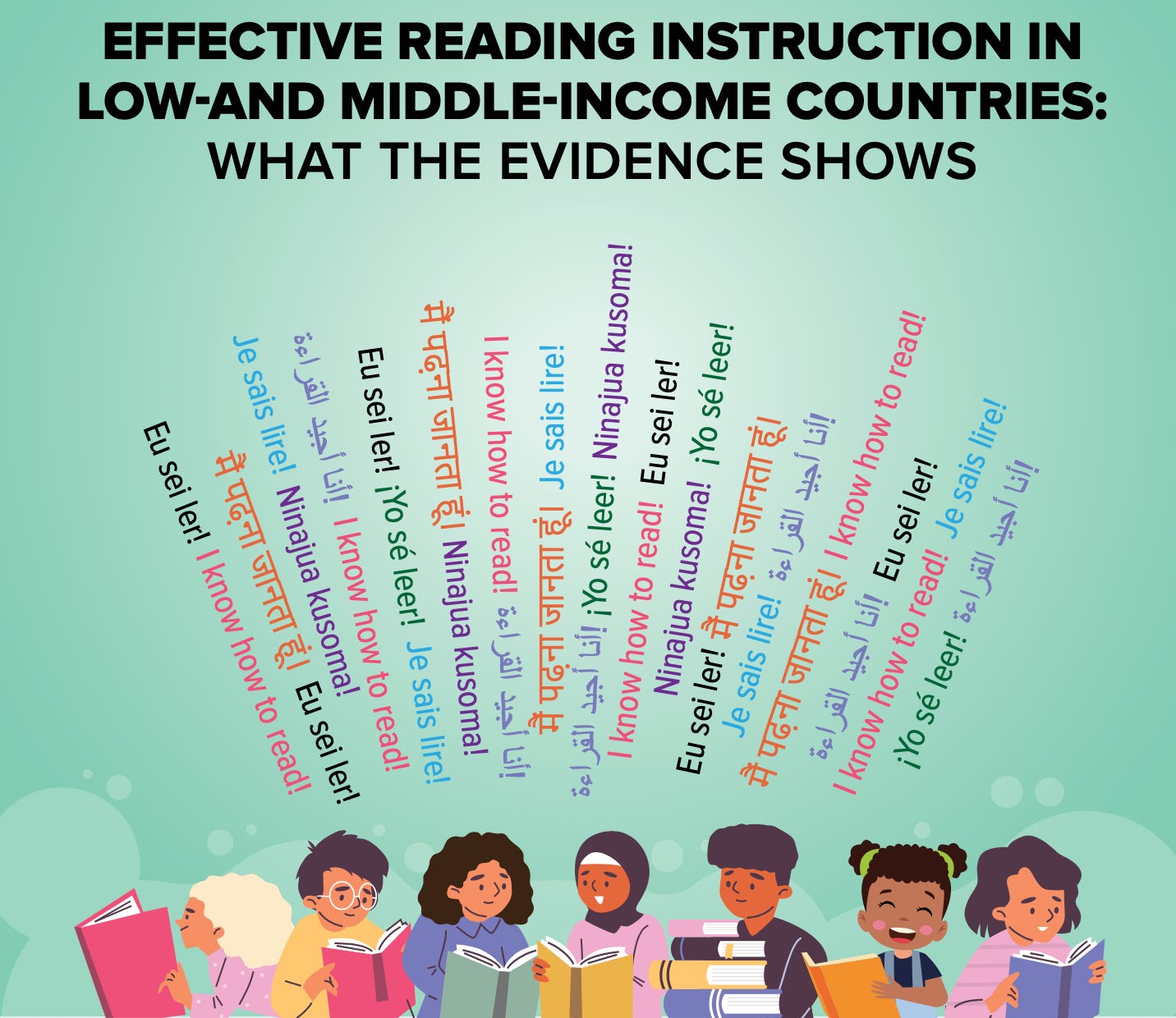Globally, reading is improved with explicit, systematic instruction--regardless of language
Why is this so controversial?
Carl Hendricks just posted on his The Learning Dispatch Substack a very interesting and important study of effective reading instruction in low- and middle-income countries (LMICs) around the world. (My thanks to Linda Diamond for alerting me to the report and the post.)
Those who follow literacy research will not be suprised.
Those who don’t follow literacy research, should do so. Otherwise they continue putting students and teachers at risk for greater reading failure. Reading failure, in most cases, is a choice.
And to those who say literacy research is all about monolingual students only, or even worse, only monolingual English-speaking students, take note of this:
[B]etween 37% and 40% of children in LMICs are taught to read in a language different from the one they speak at home (Crawford & Venegas-Marin, 2021; Del Valle Catalán, 2016). In sub-Saharan Africa, this figure rises to 87% (Crawford & Venegas-Marin, 2021). (p. 46 of the report)
I encourage everyone to read Carl’s post and go to the report itself. Here’s how he summarizes it (quoting):
This comprehensive report addresses the global literacy crisis, noting that 70% of ten year old children in low and middle income countries (LMICs) cannot read and understand a simple text. It argues this is primarily a crisis of instruction, caused by a failure to use teaching methods proven by research. The report synthesises over 120 studies from LMICs1 and confirms that the core principles of effective reading instruction, often called the “Science of Reading”2, are universal. It identifies six essential, interconnected skills that must be taught: oral language, phonological awareness, systematic phonics, reading fluency, reading comprehension, and writing. The authors conclude that these skills must be taught explicitly (modelled directly by the teacher), systematically (in a logical, planned sequence), and comprehensively (all six skills must be addressed).
I continue to puzzle over the fact that there is so much opposition to certain aspects of this, specifically “systematic phonics,” “explicitly,” and “systematically.”
How can this be harmful, bad, disrespectful, reveal a “deficit orientation,” or—incredibly—part of a right-wing plot? It just makes no sense.
Happily, there is something for everyone in this report. For example, the robust finding that “home-language instruction consistently produces better reading outcomes than second-language instruction” (p. 46). And the somewhat less robust finding that “When children develop strong reading skills in their home language, they can transfer these skills to a new language more easily” (p. 47). But note that “the transfer effect is not universal” (p. 47), a finding also reported by Elsa Cárdenas-Hagan and myself.
Then note this:
… regardless of the target [instructional] language, the core principles of the Science of Reading still apply and remain effective. (“Section 3.1: Language of Instruction,” p. 46)
I hope everyone involved in literacy research, policy, and practice will pay attention, regardless of belief, assumptions, and ideology.
What do you think are the chances?
If you haven’t already, please ….
All free; no paid level.
One of the studies was conducted in Rwanda by Elliott Friedlander, one of my doc students at Stanford. The report does not include references, but instead requires going to a QR code. But even there the reference is to an unpuplished Stanford report. Interested readers can find publications here and here.
Although many use the term “science of reading,” I prefer “best evidence from literacy research.”



As a retired teacher, (1977-2023)I was mandated to use one silver bullet after the next. Teachers are being mandated to explicitly teach phonics using any one of many popular programs. The rest the 6 essentials are harder to reduce to a set of assessments so are not mandated in the same way. We should show respect for the work teachers are doing and provide them the resources to continue their professional growth. What is cutting edge is constantly evolving. It is very hard for under supported and under resourced people to change. You don’t take swimming lessons when you’re drowning.
I have read Harriett frequently and she’s sensational!
I hear you!
Remediation Plus is my program and along with Empower we were named in Right to Read in the paper written by Dr.Siegel and Dr.Metsala
From the U.S. we are not known but Empower is absolutely not the go to
Trust me or not